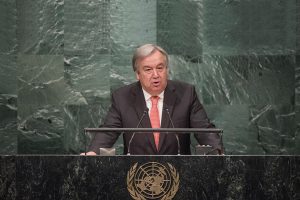The Financing for Development (FfD) Forum, convened by the UN Economic and Social Council (ECOSOC) to review the Addis Ababa Action Agenda (AAAA), other FfD outcomes, and the means of implementation of the SDGs, discussed priorities for the Fourth International Conference on Financing for Development (FfD4) in 2025. The Conference is expected to commit to concrete deliverables on FfD and to update the FfD policy framework to reflect today’s global realities.
Addressing the Forum, UN Secretary-General António Guterres called attention to the USD 4 trillion annual financing gap to achieve the SDGs, which reflects a steep increase from the USD 2.5 trillion gap before the COVID-19 pandemic. Noting that globally, four out of ten people live in countries where government spending on interest payments is greater than that on education or health, he called for a renewed push for an SDG Stimulus of USD 500 billion per year “in affordable long-term finance for developing countries.”
The Secretary-General underscored the need for:
- Donor countries to meet their official development assistance (ODA) commitments and begin discussions on general capital increases for multilateral development banks (MDBs);
- MDBs to make better use of the resources they can already access;
- Bold action to ease the debt distress; and
- Increased developing country representation across the financial system and in every decision that is made.
Guterres highlighted the Summit of the Future in September and FfD4 in 2025 as key opportunities “to reform the global financial architecture so it serves all countries who need it.”
In his remarks, President of the UN General Assembly (UNGA) Dennis Francis outlined the main findings of the 2024 Financing for Sustainable Development Report by the Inter-agency Task Force on Financing for Development (IATF), highlighting the increasing financing gap, the challenging global economic environment, inequalities, and the outdated international financial architecture.
Looking forward to the outcomes of the Spring Meetings of the World Bank Group (WBG) and the International Monetary Fund (IMF), Francis said the FfD Forum will provide critical inputs to the 2025 FfD Conference and the Summit of the Future. He called on Forum participants to close the financing gaps for the SDGs, overhaul the global financial architecture to make it work better for all, rebuild trust in governments and institutions, and formulate and finance new development pathways.
The FfD Forum featured panel discussions on: the road to FfD4; domestic public resources; domestic and international private business and finance; international development cooperation; international trade as an engine for development; debt and debt sustainability; systemic issues; and science, technology, innovation, and capacity building. General debate focused on what can be achieved at FfD4. The Forum also took stock of national-level progress in Integrated National Financing Frameworks (INFFs).
In her closing remarks, ECOSOC President Paula Narváez Ojeda welcomed the dedication participants demonstrated during discussions “as architects of a more equitable and prosperous future.” She said the sessions resulted in “a blueprint for action and highlighted the urgency of our mission.”
Narváez Ojeda highlighted the role of “small, almost imperceptible modifications that [can] sow the seed for the big changes… needed.” While those decisions may be “uncomfortable,” she said, “conversations evolve and we must evolve with them.”
The 2024 session of the ECOSOC Forum on Financing for Development Follow-up, or the FfD Forum for short, convened in New York, US, from 22-25 April 2024. Held on the sidelines of the FfD Forum from 23-25 April, the 2024 SDG Investment Fair, sought to connect investors, private and public institutions, and representatives from UN agencies to facilitate dealmaking in investment projects that advance the SDGs. During the event, impact investors received USD 50 billion worth of SDG-targeted investment proposals. [ECOSOC FfD Forum] [UN News Story]




